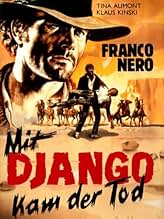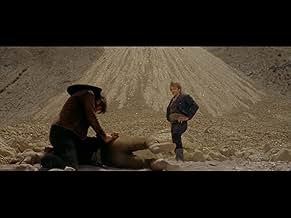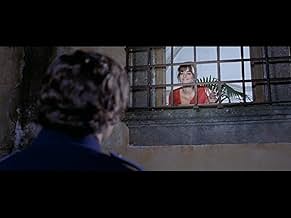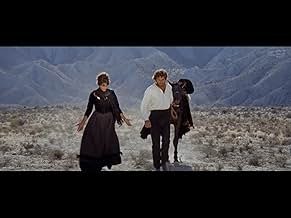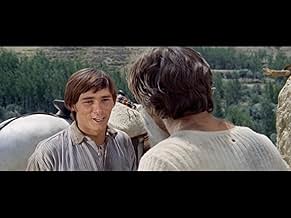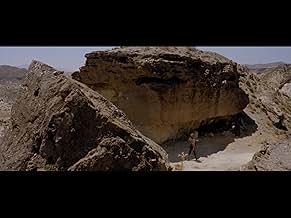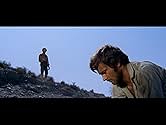L'Homme, l'Orgueil et la Vengeance
Original title: L'uomo, l'orgoglio, la vendetta
- 1967
- Tous publics
- 1h 41m
IMDb RATING
5.9/10
818
YOUR RATING
A stalwart Spanish soldier turns to a life of crime to prove his love for a mysterious and promiscuous gypsy woman.A stalwart Spanish soldier turns to a life of crime to prove his love for a mysterious and promiscuous gypsy woman.A stalwart Spanish soldier turns to a life of crime to prove his love for a mysterious and promiscuous gypsy woman.
Klaus Kinski
- Garcia
- (as Klaus Kinsky)
Guido Lollobrigida
- Dancairo
- (as Lee Burton)
Nina De Padova
- Factory Worker
- (as Anna De Padova)
Giovanni Ivan Scratuglia
- Soldier Arresting Carmen
- (as Ivan Giovanni Scratuglia)
Hans Albrecht
- Miguel, Garcia's Companion
- (uncredited)
Luisa De Padova
- Street Girl
- (uncredited)
Rex Gildo
- Soldier Arresting Carmen
- (uncredited)
Alba Maiolini
- Factory's Supervisor
- (uncredited)
Featured reviews
Intriguing hybrid adventure, as much a ripping yarn as a western.
Unredeemed human suffering, violence, lust and betrayal – this could be a spaghetti western inspired by Dostoevsky.
In a recent interview, Franco Nero contrasted the Hollywood western hero with the Italian spaghetti western hero:– the former is indeed a hero, while the latter is more a 'son-of-a-bitch'. Yet Nero plays no such 'son-of-a-bitch' role in this film. Trauma and tragedy are his lot. Nero's attitude to the marketing fixation with the 'Django' name was simply – 'It's their problem'. He maintains that he only ever made one 'Django' film, and it certainly was not this one, so don't be taken in by the German title of 'Mit Django kam der Tod' ('With Django Came Death').
It is hard to believe that such awesome landscapes exist within our very own EU (shot in Andalucia!). I particularly enjoyed the careful rationing of images of water, which contrasted so starkly with the bone-dry natural setting. The change of location from Spain to Mexico in the uncut German version gets away with murder. For example, one scene showing the longing for an escape from an outlaw's exile in the desert is expressed in some shot-reverse-shot images of a tortured gaze at flamingos taking off from a lake. The birds are fortunately native to both Spain and Mexico...
Gypsies too are native to both – though our Carmen (i.e. Django's 'Conchita' in the uncut German) would be a rather Spanish-looking gypsy for Mexico, were it not for the black mourning clothes she wears in remembrance of her mother. The Italian-to-German dubbing has been done to a high standard – no mean feat considering that the names of characters and locations have also been altered in the German. Soldiers of the Spanish Bourbon regime must have had uniforms that almost pass for those of the US Civil War – or can some military history hack out there expose the shameless German tampering ...?
Unredeemed human suffering, violence, lust and betrayal – this could be a spaghetti western inspired by Dostoevsky.
In a recent interview, Franco Nero contrasted the Hollywood western hero with the Italian spaghetti western hero:– the former is indeed a hero, while the latter is more a 'son-of-a-bitch'. Yet Nero plays no such 'son-of-a-bitch' role in this film. Trauma and tragedy are his lot. Nero's attitude to the marketing fixation with the 'Django' name was simply – 'It's their problem'. He maintains that he only ever made one 'Django' film, and it certainly was not this one, so don't be taken in by the German title of 'Mit Django kam der Tod' ('With Django Came Death').
It is hard to believe that such awesome landscapes exist within our very own EU (shot in Andalucia!). I particularly enjoyed the careful rationing of images of water, which contrasted so starkly with the bone-dry natural setting. The change of location from Spain to Mexico in the uncut German version gets away with murder. For example, one scene showing the longing for an escape from an outlaw's exile in the desert is expressed in some shot-reverse-shot images of a tortured gaze at flamingos taking off from a lake. The birds are fortunately native to both Spain and Mexico...
Gypsies too are native to both – though our Carmen (i.e. Django's 'Conchita' in the uncut German) would be a rather Spanish-looking gypsy for Mexico, were it not for the black mourning clothes she wears in remembrance of her mother. The Italian-to-German dubbing has been done to a high standard – no mean feat considering that the names of characters and locations have also been altered in the German. Soldiers of the Spanish Bourbon regime must have had uniforms that almost pass for those of the US Civil War – or can some military history hack out there expose the shameless German tampering ...?
The reviews here can be modified by the Blu-ray version of 26 May 2015 by Blue Underground in the USA with the title "Man, Pride and Vengeance" that matches the original "L'uomo, l'orgoglio, la vendetta." The movie is clearly and credited as based on Prosper Mérimée's "Carmen." The second half of the movie is realized in the style of Italian Westerns, but to attach it to a Django would be to raise the actor, Franco Nero, above the plot.
The box for the DVD does almost claim too much in saying that the film was "lensed" by Vittorio Storaro. He was the camera operator, and Camillo Bazzoni, brother of the director, was the cinematographer. There are lively travelling shots of running and horseback, lucid fight scenes, and desolate landscapes.
A problem it seems to me is dewy teen-aged Tina Aumont as Carmen. The character is a woman who could have a Klaus Kinski type as a husband. Who could have played her? Sophia Loren? But her agent wouldn't have let her. Aumont's mother, Maria Montez? Vanessa Redgrave.
The box for the DVD does almost claim too much in saying that the film was "lensed" by Vittorio Storaro. He was the camera operator, and Camillo Bazzoni, brother of the director, was the cinematographer. There are lively travelling shots of running and horseback, lucid fight scenes, and desolate landscapes.
A problem it seems to me is dewy teen-aged Tina Aumont as Carmen. The character is a woman who could have a Klaus Kinski type as a husband. Who could have played her? Sophia Loren? But her agent wouldn't have let her. Aumont's mother, Maria Montez? Vanessa Redgrave.
Luigi Bazzoni's "L'Uomo L'Orgoglio, La Vendetta" aka. "Man, Pride & Vengeance" is a quite original little film, as it narrates the story of the famous opera/novel "Carmen" in the style of a Spaghetti Western. Contrary to the common belief, however, this movie is actually not (originally) a Western. The film, which originally takes place in 19th century Spain, was made a Spaghetti Western in the German language version (and in the English version I suppose) by simply changing the plot. Spain becomes Mexico in these versions of the movie, and that's why this film that is often incorrectly referred to as a Western. The plot makes a lot more sense when the movie is regarded in is original context (I've never heard of Mexican Gypsies at least). Although this is actually no Western, however, it has all the elements of a typical Spaghetti Western, and can therefore be classified as a film of that genre, even though it actually takes place in Europe. Western or not, this is certainly a pretty original and entertaining (allthough in no way outstanding) film, with a brilliant cast. This movie unites two of the most outstanding Spaghetti Western actors, Franco Nero, since "Django" one of the greatest leading men of the Italian Western, and Klaus Kinski, one of my personal favorite actors of all-time, and furthermore features the great and stunningly beautiful Tina Aumont (who sadly passed away last year) in the female lead.
The plot, which is taken from the "Carmen" plot, begins when soldier Don José (Franco Nero) first meets the stunningly beautiful Gypsy woman Carmen (Tina Aumont), a femme fatale, who makes him range between his passion and his sense of duty...
As mentioned above, the performances are brilliant. Franco Nero once again delivers an excellent performance in the lead, Tina Aumont fits perfectly in her femme fatale role and Klaus Kinski is great as always in his typical role of the villainous psycho. The supporting cast furthermore includes Guido Lollobrigida, Franco Ressel and Alberto Dell'Acqua.
In German speaking countries this movie was, by the way, marketed as a "Django"-sequel, which is even more inappropriate with this movie than with other Franco Nero Westerns that were inappropriately given Django-titles (such as "Massacre Time" and "Texas Addio").
The movie is original and entertaining, but it also has its flaws, and gets quite boring in some parts. The best parts of the movie are those featuring Kinski (whose villain-role is unfortunately not too big). Anyhow, an enjoyable film that I recommend to my fellow Spaghetti Western enthusiasts as a quite different genre-entry that is, strictly speaking, not really a Western. 6/10
The plot, which is taken from the "Carmen" plot, begins when soldier Don José (Franco Nero) first meets the stunningly beautiful Gypsy woman Carmen (Tina Aumont), a femme fatale, who makes him range between his passion and his sense of duty...
As mentioned above, the performances are brilliant. Franco Nero once again delivers an excellent performance in the lead, Tina Aumont fits perfectly in her femme fatale role and Klaus Kinski is great as always in his typical role of the villainous psycho. The supporting cast furthermore includes Guido Lollobrigida, Franco Ressel and Alberto Dell'Acqua.
In German speaking countries this movie was, by the way, marketed as a "Django"-sequel, which is even more inappropriate with this movie than with other Franco Nero Westerns that were inappropriately given Django-titles (such as "Massacre Time" and "Texas Addio").
The movie is original and entertaining, but it also has its flaws, and gets quite boring in some parts. The best parts of the movie are those featuring Kinski (whose villain-role is unfortunately not too big). Anyhow, an enjoyable film that I recommend to my fellow Spaghetti Western enthusiasts as a quite different genre-entry that is, strictly speaking, not really a Western. 6/10
Scores of films have been inspired by Georges Bizet's opera Carmen, but here is one with a difference. The director Luigi Bazzoni (working with Italy's most illustrious script-writer, Suso Cecchi d'Amico) chose to ditch the opera, go back to Prosper Merimee's original novella - and shoot it in the style of a Spaghetti Western!
Bazzoni's camerawork is more frenetic than inventive, and his film never quite works. Still, it does boast a wondrous cast. Franco Nero, blue eyes blazing in his dark-bronzed face, is the naive young soldier Jose. Klaus Kinski, teeth gnashing and lips curling in his usual manner, is the sadistic bandit Garcia. And lovely Tina Aumont enjoys a rare leading role as Carmen - the amoral and seductive gypsy who drags both men to their doom.
Aumont may not be the world's greatest actress. (In fact, she can barely act at all!) But like her mother, Maria 'Cobra Woman' Montez, she seems to have the words FEMME FATALE emblazoned in bright scarlet letters across her forehead. Her enormous dark eyes are wells of untold depravity. Her pouting, voluptuous mouth would lure any man to his ruin. If you remember anything in this film, it will be her.
Bazzoni's camerawork is more frenetic than inventive, and his film never quite works. Still, it does boast a wondrous cast. Franco Nero, blue eyes blazing in his dark-bronzed face, is the naive young soldier Jose. Klaus Kinski, teeth gnashing and lips curling in his usual manner, is the sadistic bandit Garcia. And lovely Tina Aumont enjoys a rare leading role as Carmen - the amoral and seductive gypsy who drags both men to their doom.
Aumont may not be the world's greatest actress. (In fact, she can barely act at all!) But like her mother, Maria 'Cobra Woman' Montez, she seems to have the words FEMME FATALE emblazoned in bright scarlet letters across her forehead. Her enormous dark eyes are wells of untold depravity. Her pouting, voluptuous mouth would lure any man to his ruin. If you remember anything in this film, it will be her.
Did you know
- TriviaMan, Pride and Vengeance (Italian: L'Homme, l'Orgueil et la Vengeance (1967), German: Mit Django kam der Tod) is a 1967 Spaghetti Western film written and directed by Luigi Bazzoni and starring Franco Nero, Tina Aumont, and Klaus Kinski. It is a Western film adaptation of the novella Carmen by Prosper Mérimée, and is one of the few Westerns not only filmed, but also set in Europe.
- Alternate versionsThe German version was cut to 91 minutes and calls the main characters Django and Conchita.
- ConnectionsReferenced in Kathenas me tin trella tou... (1980)
- How long is Man, Pride & Vengeance?Powered by Alexa
Details
- Runtime
- 1h 41m(101 min)
- Sound mix
- Aspect ratio
- 2.35 : 1
Contribute to this page
Suggest an edit or add missing content

